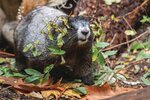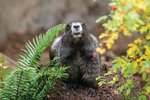

Northwest Trek Wildlife Park welcomed a new furry friend for its public debut last week: a food-conditioned hoary marmot staff named Chestnut. The young marmot was estimated to be born in spring of 2022.
Before making its way to Northwest Trek and receiving its name, Chestnut lived in Mount Rainier National Park where it became accustomed to human food and eventually began “aggressively begging” for comestibles from visitors. The animal eventually became a “danger to himself and people,” according to Mount Rainier National Park officials.
“Food-conditioned animals will beg aggressively for food and may bite, causing serious injury and possible infection to people,” said Dr. Tara Chestnut, former wildlife ecologist for Mount Rainier National Park, in a media release. “Feeding an animal can also potentially spread diseases among animals and people. In most cases, the only solution for food-conditioned animals is to remove them, which typically means humanely euthanizing them.”
The young marmot was named after Dr. Chestnut, according to the release.
Dr. Chestnut observed the marmot’s behavior and evaluated its young age before calling Northwest Trek’s head veterinarian, Dr. Allison Case. Chestnut asked Case if the marmot could be a candidate to become an ambassador animal at Northwest Trek.
An ambassador animal teaches “real-life” lessons to the visiting public about how to be “good stewards of public lands,” according to the release. After evaluating the young animal, Case determined the marmot was a good candidate to become an ambassador animal after learning its history and because the wildlife park had the space.
If the answer to the marmot becoming an ambassador animal was no, the animal would have been euthanized.
“Animals that are habituated to humans and become food-conditioned are often killed by traffic or euthanized for public safety,” Dr. Chestnut said. “We are fortunate that Northwest Trek can provide a great home for this marmot so he can live a full life. Most wild animals that become habituated to people are not so lucky.”
Dr. Chestnut and Northwest Trek staff have closely worked together for years on different conservation projects, including restoring fishers to Washington’s Cascade Mountain Range, according to the press release. The keepers wanted to honor their relationship and Dr. Chestnut’s dedication to wild animals by naming the marmot after her.
“Together, we agreed this would be an incredible learning opportunity for the public,” Case said. “This marmot will be a wonderful ambassador for his wild counterparts and encourage our guests to respect and appreciate wildlife from a distance when visiting our parks and other natural areas.”
Chestnut is the first animal of his kind to live at Northwest Trek, leaving staff curious upon the hoary marmot’s arrival.
When a new animal arrives at Northwest Trek, they undergo a comprehensive health exam. Chestnut’s health exam saw keepers taking turns admiring the giant rodent while Dr. Case, associate veterinarian Dr. Cassidy Soehnlein and veterinary technician Tracy Cramer took blood samples, X-rays, trimmed his nails, vaccinated him, examined his mouth and teeth and weighed him.
Case said Chestnut appears to be a “very healthy, young rodent.”
Hoary marmots are the largest member of the squirrel family and are common in the subalpine regions of Mount Rainier National Park, according to the press release. The species can be found all the way to Alaska and eat vast amounts of meadow vegetation. Marmots also develop thick layers of fat that allows them to survive through eight to nine months of hibernation each year.
The species was named the hoary marmot for its silvery gray fur on their shoulders and upper back and are sometimes known as “whistle pigs” for the loud, shrill whistle call they can make at the sight of a predator, the press release stated.
To prevent animals like Chestnut from becoming food conditioned, wildlife experts urge the public to always store food, beverages and toiletries in a hard-sided vehicle, campground food lockers or in bear-resistant containers when visiting parks. They recommend the public avoid feeding the wildlife, keeping campsites clean and by packing out all food and garbage. According to the press release, in addition to being fed by people, animals can become food-conditioned by eating food left in trash cans or left as litter. People should also keep a safe, respectful distance from wildlife, according to the press release.
Guests can see Chestnut in the wetlands habitat of Northwest Trek Wildlife Park, which is open from 9:30 a.m. to 3 p.m. Friday through Sunday at 11610 Trek Drive E. in Eatonville.